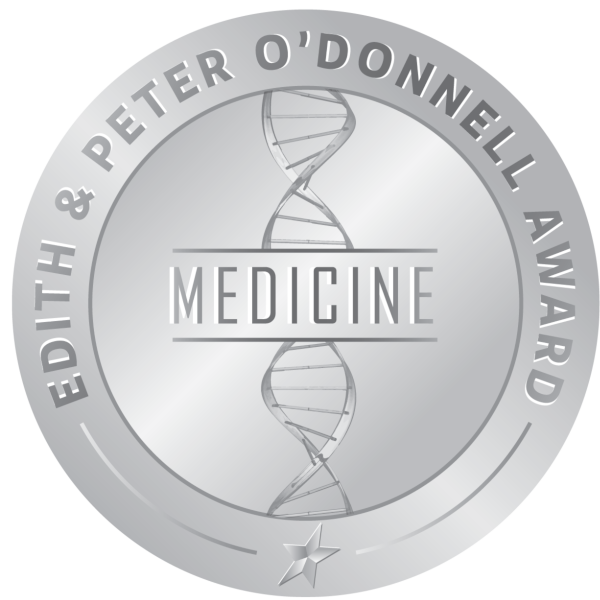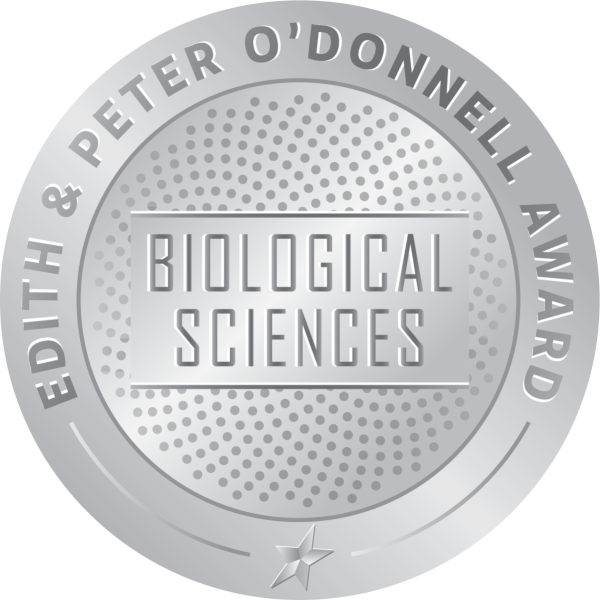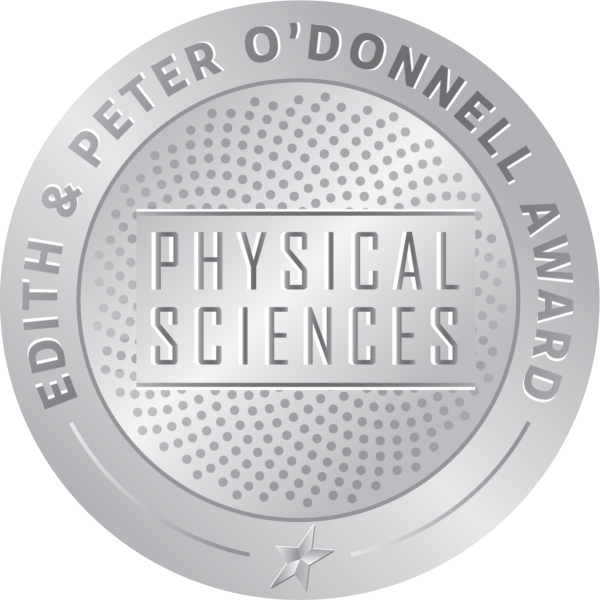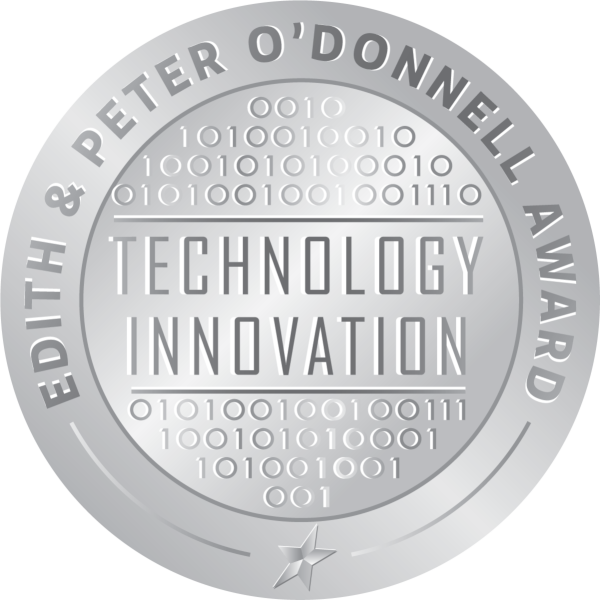TAMEST Edith and Peter O’Donnell Awards

The O’Donnell Awards acknowledge outstanding achievements by Texas-based researchers in five categories: medicine, engineering, biological sciences, physical sciences and technology innovation.
Each award includes a $25,000 honorarium and an invitation to present at TAMEST’s Annual Conference each year. Since 2006, 18 O’Donnell Awards recipients have been elected to one of the National Academies and six have been elected to multiple academies.
Nominations are open for the 2027 O’Donnell Awards through Monday, March 30, 2026, at 6:00 p.m. CT. All nominations must be submitted through the online portal. If you have any questions, please contact Stephanie Shaw at stephanie.shaw@austin.utexas.edu or (512) 471-3823.
2027 O'Donnell Awards Information Sessions
To learn more about the nomination process for the O’Donnell Awards, join one or both information sessions on Thursday, February 12, 2026, on Zoom. The medicine, engineering, biological sciences and physical sciences awards session will take place from 10:00–10:45 a.m. CT. The technology innovation award session will take place from 1:00–1:45 p.m. CT.
Information Session:
Medicine, Engineering, Biological Sciences & Physical Sciences
Thursday, February 12, 2026, at 10:00 a.m.
Information Session:
Technology Innovation
Thursday, February 12, 2026, at 1:00 p.m.
Join Us for the 20th Anniversary O’Donnell Awards and Dinner
Save the date for the 20th Anniversary Edith and Peter O’Donnell Awards Ceremony and Dinner. The reception at the TAMEST 2026 Annual Conference: Pioneering Climate Innovations will mark 20 years since the awards were first given. We hope you can join us on Tuesday, February 3, 2026, to celebrate this special occasion at the Kimpton Santo Hotel in San Antonio, Texas. Register for the conference here. Tickets to the anniversary reception and dinner are included.
2026 O’Donnell Awards Recipients
These are the breakthroughs by Texas’ rising stars in research being honored with the 2026 Edith and Peter O’Donnell Awards by TAMEST:
Nomination Guidelines and Application
Nominations are open for the 2027 O’Donnell Awards through Monday, March 30, 2026, at 6:00 p.m. CT.
Nomination Guides
For more detailed information on submitting a nomination, download the appropriate guide below:
Application
Nominations are open for the 2027 O’Donnell Awards through Monday, March 30, 2026, at 6:00 p.m. CT. All nominations must be submitted through the online portal.
Nomination Guidelines and Eligibility Requirements
Nomination Guidelines
Nomination Categories
Nominators must choose only one category — Medicine, Engineering, Biological Sciences, Physical Sciences, or Technology Innovation—for their nominee. The O’Donnell Awards Selection Committee reserves the right to move a nominee into a different category if they determine it to be a better fit.
Renomination of Candidates from Previous Year
All nominees will be automatically renominated for the two years following their initial nomination, provided they continue to meet all eligibility requirements. To ensure nominees remains strong in the review process, nominators are encouraged to update nomination materials. Nominators wishing to withdraw a nominee or update nomination materials may contact TAMEST staff to make the changes.
Research Teams
Research teams may be nominated in any category, provided that each team member meets all eligibility requirements. If a research team is selected to receive an award, the $25,000 honorarium will be divided evenly among the team members, and each member will receive a medal.
Nominator Requirements
Qualified nominators include TAMEST members, university presidents, chancellors, provosts, deans, vice presidents for research, department chairs, past O’Donnell Awards recipients, industry executives, administrators and managers.
Content Guidelines
Instructions for preparing nominations are meant to serve as guidelines. TAMEST encourages nominators to be innovative in presenting candidate accomplishments. The committee is looking for substantiation of achievements as well as the significance of the nominee's accomplishments. Please include information regarding how the nominee helps train and mentor the next generation of scientists.
Eligibility Requirements
Medicine, Engineering and Sciences Eligibility Requirements
- Nominees must be within 15 years of their first faculty appointment as of calendar year 2011 or later.
- Nominees must have spent the past two years performing research in Texas.
- For team nominations, all team members must meet eligibility requirements.
- TAMEST members are not eligible.
Technology Innovation Eligibility Requirements
- Nominees must be within 25 years from their first full-time private-sector or government- affiliated position as of calendar year 2001 or later.
- Nominees must have been continually employed in Texas for the past two years.
- For team nominations, all team members must meet eligibility requirements. If a research team is selected to receive an award, the $25,000 honorarium will be divided evenly among the team members, and each member will receive a medal.
- TAMEST members are not eligible.
Selection Process
A committee of TAMEST members (Texas-based members of the National Academies) evaluates nominations and recommends recipients, in consultation with a panel of National Academies members from outside of Texas. A committee of Texas Nobel and Breakthrough Laureates reviews and endorses the recipients. The TAMEST Board of Directors provides final approval of the recipients.
Resources
For questions, contact Stephanie Shaw at stephanie.shaw@austin.utexas.edu or at (512) 471-3823.
2026 O’Donnell Awards Committee
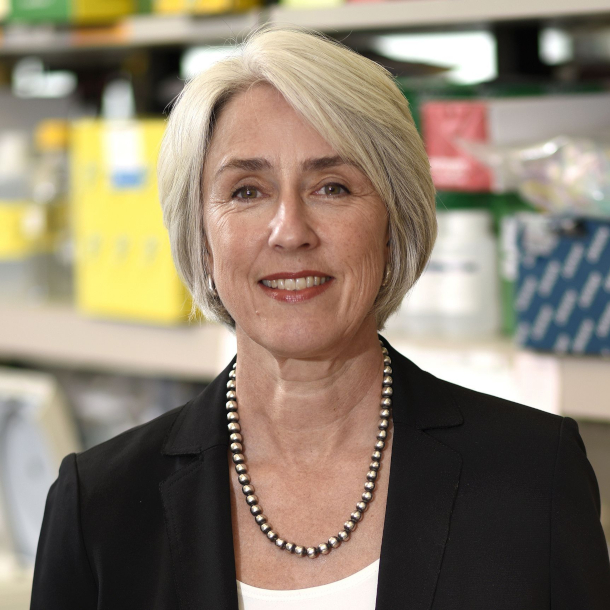
Margaret “Peggy” A. Goodell, Ph.D. (NAM, NAS)
Awards Committee Chair
Baylor College of Medicine
Medicine Subcommittee
- Maria Elena Bottazzi, Ph.D. (NAM), Baylor College of Medicine
- Kendall M. Campbell, M.D. (NAM), The University of Texas, Medical Branch at Galveston
- David R. Piwnica-Worms, M.D., Ph.D. (NAM), The University of Texas MD Anderson Cancer Center
Engineering Subcommittee
- Robert B. Gilbert, Ph.D. (NAE), The University of Texas at Austin
- Frances S. Ligler, D.Phil., D.Sc. (NAE), Texas A&M University
- Karen Lozano, Ph.D. (NAE), Rice University
Science Subcommittee – Biological
- Russell A. DeBose-Boyd, Ph.D. (NAS), UT Southwestern Medical Center
- Mark A. Kirkpatrick, Ph.D. (NAS), The University of Texas at Austin
- Richard D. Wood, Ph.D. (NAS, FRS), The University of Texas MD Anderson Cancer Center
Science Subcommittee – Physical
- Robert C. Kennicutt, Ph.D. (NAS, FRS), Texas A&M University
- Allan H. MacDonald, Ph.D. (NAS), The University of Texas at Austin
- Ramamoorthy Ramesh, Ph.D. (NAE, NAS, FRS), Rice University
Technology Innovation Subcommittee
- Leo H. Chiang, Ph.D. (NAE), Lubrizol
- Qinghuang Lin, Ph.D. (NAE), Canon Nanotechnologies, Inc.
- Jie Zhang, Ph.D. (NAE), GeoTomo
Nobel and Breakthrough Laureates Committee
James P. Allison, Ph.D. (NAM, NAS)
Chair, Department of Immunology and Executive Director, Immunotherapy Platform
Deputy Director, David H. Koch Center for Applied Research of Genitourinary Cancers
The University of Texas MD Anderson Cancer Center
Nobel Prize in Physiology or Medicine, 2018
Bruce A. Beutler, M.D. (NAM, NAS)
Regental Professor
Director of the Center for Genetics of Host Defense
UT Southwestern Medical Center
Nobel Prize in Physiology or Medicine, 2011
Michael S. Brown, M.D. (NAM, NAS)
Paul J. Thomas Professor of Molecular Genetics
Director of the Jonsson Center for Molecular Genetics
UT Southwestern Medical Center
Nobel Prize in Physiology or Medicine, 1985
Zhijian “James” Chen, Ph.D. (NAM, NAS, FRS)
Howard Hughes Medical Institute
George L. MacGregor Distinguished Chair in Biomedical Science
Professor, Department of Molecular Biology
UT Southwestern Medical Center
Breakthrough Prize in Life Sciences, 2019
Regental Professor Virginia and Edward Linthicum Distinguished Chair in Biomolecular Science
UT Southwestern Medical Center
Nobel Prize in Chemistry, 1988
Joseph L. Goldstein, M.D. (NAM, NAS)
Chairman of the Department of Molecular Genetics
UT Southwestern Medical Center
Nobel Prize in Physiology or Medicine, 1985
Helen H. Hobbs, M.D. (NAM, NAS)
Director, Eugene McDermott Center for Growth and Development; Professor of Internal Medicine and Molecular Genetics
Howard Hughes Investigator
UT Southwestern Medical Center
Breakthrough Prize in Life Sciences, 2015
Huda Y. Zoghbi, M.D. (NAM, NAS)
Distinguished Service Professor, Department of Molecular and Human Genetics
Director, Jan and Dan Duncan Neurological Research Institute
Investigator, Howard Hughes Medical Institute
Baylor College of Medicine
Breakthrough Prize in Life Sciences, 2017
Edith and Peter O’Donnell Awards 10th Anniversary
2016 marked the 10th anniversary of the O’Donnell Awards. Over $1 million has been awarded to dozens of recipients in the categories of medicine, engineering, science and technology innovation since the inception of the program. The awards are named in honor of Edith and Peter O’Donnell who are among Texas’ staunchest advocates for excellence in scientific advancement and STEM education.
O’Donnell Awards Supporters
The Edith and Peter O’Donnell Awards Endowment Fund was established in 2005 through the generous contributions of the following individuals and organizations:
- Dr. and Mrs. Kenneth Altshuler
- Anonymous (2)
- AT&T Foundation
- Austin Industries, Inc. and William T. Solomon, Former President, CEO and Chairman
- Julie and Louis A. Beecherl
- Melanie and Tim Byrne
- Mr. and Mrs. W. Plack Carr Jr.
- William P. and Rita Clements Jr.
- Collins Family Foundation
- Mr. and Mrs. Edward A. Copley
- The Cullen Foundation
- Cullen Trust for Health Care
- Cullen Trust for Higher Education
- Dell Inc.
- Hunt Consolidated, Inc.
- Kodosky Foundation
- The Eugene McDermott Foundation
- The Robert and Janice McNair Foundation
- The Rodger Meier Family
- Joyce and Harvey Mitchell
- National Instruments
- Edith and Peter O’Donnell
- Margot and Ross Perot
- Caren H. Prothro & The Vin and Caren Prothro Foundation
- Rowling Foundation
- Southwestern Medical Foundation
- Ron and Phyllis Steinhart
- Susser Family Foundation in Honor of Mr. and Mrs. Ron Steinhart
- Temple-Inland
- Texas Instruments Foundation
- TXU Energy
- Valero Energy Foundation
- Dr. and Mrs. Kern Wildenthal
- Cheryl and Sam Wyly
- Dee and Charles Wyly
- Zachry Foundation
2025–2026 O’Donnell Endowment Gifts
(Updated January 31, 2026)
Rebecca Nelson Davis (In Memory of Edith and Peter O’Donnell)
David R. Piwnica-Worms, M.D., Ph.D.
Helen Piwnica-Worms, Ph.D.
Past O’Donnell Awards Recipients
Learn about our past recipients by clicking on a category below.








